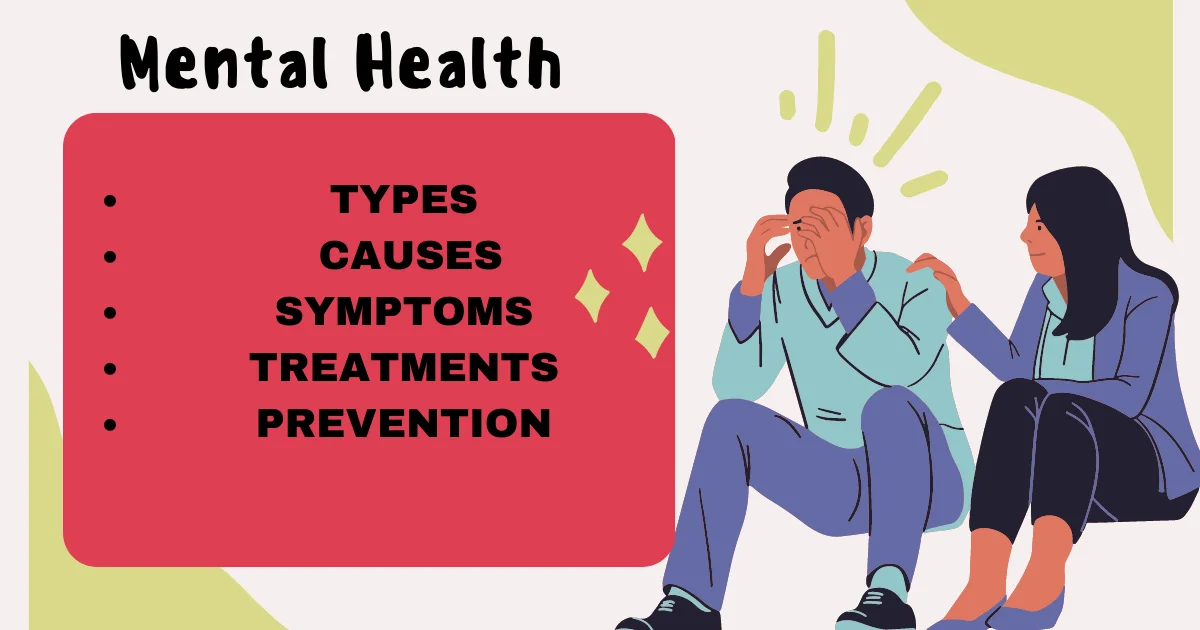Mental health refers to the overall well-being of a person’s emotional, psychological, and social state. It encompasses how we feel, think, and behave in our daily lives. A person’s mental health can be influenced by various factors, including genetics, environment, life experiences, and more. When someone is struggling with their mental health, they may experience a range of symptoms such as anxiety, depression, mood swings, or changes in sleep and eating habits. It’s important to prioritize mental health and seek support when needed. There are many resources available to help individuals manage and improve their mental health, including therapy, medication, and self-care practices.

What is Mental Health ?
Mental health is the state of a person’s emotional, psychological, and social well-being. It affects how they think, feel, and behave in their daily life.
Types of Mental Health
Here are some common types of mental health conditions:
1.Anxiety Disorders:
A group of mental health conditions characterized by excessive fear, worry, and anxiety that can interfere with daily life. Examples include Generalized Anxiety Disorder (GAD), Panic Disorder, and Social Anxiety Disorder.
2.Mood Disorders:
A group of mental health conditions characterized by persistent changes in mood or affect. Examples include Depression and Bipolar Disorder.
3.Psychotic Disorders:
A group of mental health conditions characterized by a loss of touch with reality, including hallucinations and delusions. Examples include Schizophrenia and Schizoaffective Disorder.
4.Personality Disorders:
A group of mental health conditions characterized by inflexible and maladaptive patterns of thinking, feeling, and behaving that can cause significant impairment in social and occupational functioning. Examples include Borderline Personality Disorder and Narcissistic Personality Disorder.
5.Eating Disorders:
A group of mental health conditions characterized by abnormal and unhealthy eating habits that can lead to physical and mental health problems. Examples include Anorexia Nervosa, Bulimia Nervosa, and Binge Eating Disorder.
6.Substance Use Disorders:
A group of mental health conditions characterized by problematic use of alcohol or drugs that can lead to physical and mental health problems. Examples include Alcohol Use Disorder and Opioid Use Disorder.
Read more..Anxiety-causes,symptoms,& Treatments What Helps People cope with Depression Sleeping Problem and Solution
What are the Causes and Risk factors of Mental Disorders
There are several causes and risk factors that can increase the likelihood of developing a mental disorder.
Here are some of the known causes and risk factors of mental disorders:
1.Genetics: Some mental disorders have a genetic component, meaning that they can be inherited from family members who have the same condition.
2.Environment: Factors in the environment such as trauma, abuse, neglect, or a stressful life event can trigger or exacerbate mental health symptoms.
3.Brain Chemistry and Structure: Imbalances in brain chemistry or structural abnormalities in the brain can contribute to the development of mental disorders.
4.Substance Use: Substance use, abuse, and addiction can significantly increase the risk of developing a mental disorder.
5.Medical Conditions: Certain medical conditions such as thyroid disorders, brain injuries, or neurological disorders can contribute to the development of mental health symptoms.
6.Developmental Factors: Early life experiences, such as childhood trauma or abuse, can have a lasting impact on mental health.
7.Social Factors: Social factors, such as poverty, isolation, or discrimination, can contribute to the development of mental health problems.
8.Trauma or Abuse: Experiencing traumatic or abusive events, especially during childhood, can increase the risk of developing a mental disorder.
9.Chronic Stress: Experiencing chronic stress, such as work-related stress or financial stress, can increase the risk of developing a mental disorder.
It’s important to note that mental disorders are complex and often result from a combination of these and other factors. It’s important to remember that having one or more of these risk factors does not necessarily mean that someone will develop a mental disorder, but being aware of these risk factors can help individuals take steps to reduce their risk, such as seeking professional help for mental health concerns, practicing self-care, and developing healthy coping strategies.
What are the Signs of Mental Disorder?
The signs of a mental disorder can vary depending on the specific condition, but here are some common symptoms to look out for:
1.Changes in Mood: Persistent feelings of sadness, hopelessness, or irritability that don’t go away.
2.Changes in Behavior: Withdrawing from friends and family, or engaging in risky behaviors that are out of character.
3.Changes in Thinking: Difficulty concentrating or focusing, racing thoughts, or having persistent negative thoughts.
4.Changes in Sleep Patterns: Difficulty sleeping or sleeping too much.
5.Changes in Appetite: Changes in eating habits, including overeating or undereating.
6.Physical Symptoms: Unexplained physical symptoms such as headaches, stomach aches, or muscle tension.
7.Substance Use: Increased use of alcohol or drugs to cope with emotional or psychological distress.
It’s important to note that experiencing these symptoms doesn’t necessarily mean that someone has a mental disorder, but if they persist for an extended period of time and interfere with daily functioning, it’s important to seek professional help from a mental health provider. A mental health provider can help diagnose and develop a treatment plan for mental health concerns.
Diagnosis of Mental Disorder
The diagnosis of a mental disorder involves a comprehensive assessment by a mental health professional. Here are some common steps in the diagnostic process:
1.Clinical Interview: The mental health professional will conduct a clinical interview to gather information about the individual’s symptoms, medical history, family history, and other relevant factors.
2.Psychological Testing: The mental health professional may administer psychological tests to help identify specific mental health conditions or rule out other potential causes of the symptoms.
3.Physical Examination: In some cases, the mental health professional may conduct a physical examination to rule out any medical conditions that could be contributing to the symptoms.
4.Diagnostic Criteria: The mental health professional will use established diagnostic criteria from the Diagnostic and Statistical Manual of Mental Disorders (DSM-5) to identify the specific mental health condition.
5.Treatment Plan: Based on the diagnosis, the mental health professional will develop a treatment plan that may include medication, psychotherapy, or other forms of treatment.
Treatment of Mental Disorder
The treatment of a mental disorder depends on the specific condition and the individual’s unique circumstances. Here are some common types of treatments for mental health conditions:
1.Medication: Medication can be used to treat many mental health conditions, including depression, anxiety, bipolar disorder, and schizophrenia.
2.Psychotherapy: Psychotherapy, also known as talk therapy, involves meeting with a mental health professional to discuss and work through mental health concerns.
3.Cognitive Behavioral Therapy (CBT): CBT is a type of psychotherapy that focuses on identifying and changing negative thought patterns and behaviors.
4.Support Groups: Support groups provide a safe and supportive environment for individuals to connect with others who are going through similar mental health challenges.
5.Hospitalization: In some cases, hospitalization may be necessary to provide intensive treatment and support for severe mental health conditions.
6.Lifestyle Changes: Making lifestyle changes, such as improving sleep habits, reducing stress, and increasing physical activity, can be effective in managing many mental health conditions.
It’s important to note that treatment for mental health concerns is highly individualized and may involve a combination of different approaches. Seeking professional help from a mental health provider is the best way to develop a treatment plan that meets an individual’s unique needs and circumstances.
Prevention of Mental Disorder
Preventing mental disorders is not always possible, but there are steps individuals can take to reduce their risk of developing a mental health condition. Here are some strategies for preventing mental disorders:
1.Build Resilience: Developing resilience, which is the ability to cope with stress and adversity, can help individuals manage and prevent mental health conditions.
2.Practice Self-Care: Practicing self-care, such as getting enough sleep, exercising regularly, and eating a healthy diet, can help reduce stress and improve mental health.
3.Seek Help Early: If an individual is experiencing symptoms of a mental health condition, seeking help early can help prevent the condition from becoming more severe.
4.Manage Stress: Developing healthy coping strategies for managing stress, such as meditation or deep breathing, can help prevent mental health conditions.
5.Build Social Connections: Building strong social connections with friends, family, and community can provide support and reduce the risk of developing a mental health condition.
6.Address Trauma: Addressing past trauma through therapy or other support services can help prevent the development of mental health conditions.
It should be important to remember that preventing mental health conditions is not always possible, and seeking professional help when experiencing symptoms is essential. Mental health providers can help individuals develop personalized strategies for preventing and managing mental health conditions.
Conclusion
In conclusion, mental health is an essential aspect of overall health and well-being. Mental health problems can have a significant impact on a person’s quality of life and relationships, but with proper diagnosis, treatment, and support, individuals can manage their conditions and lead fulfilling lives. Raising awareness about mental health and reducing the stigma surrounding mental illness is crucial in promoting early detection and treatment, as well as creating a more compassionate and understanding society for those affected by mental health problems
Disclaimer: The content provided in this mental health blog is for informational purposes only and should not be considered a substitute for professional medical advice or treatment. If you or someone you know is experiencing mental health issues, please seek help from a qualified healthcare professional or mental health specialist.
FAQ
Why is mental health important?
Mental health is important because it affects how individuals think, feel, and behave. Good mental health is essential for overall well-being, and can impact relationships, work, and daily life.
What is the treatment of mental health?
The treatment of mental health involves a range of approaches, including medication, therapy, lifestyle changes, and support groups, depending on the individual's specific condition and circumstances. Seeking professional help is important to develop an effective treatment plan.
How does social media affect Mental Health?
Social media can have both positive and negative effects on mental health, with potential benefits including increased social connection and support, but also potential harms such as cyberbullying and negative comparisons to others, which can contribute to anxiety and depression.
How to improve mental health ?
Ways to improve mental health include practicing self-care, building strong social connections, seeking help when needed, and engaging in activities that bring joy and fulfillment. It's important to remember that mental health is a journey, and progress can be made with time and effort.
When is Mental Health Awareness Month?
Mental Health Awareness Month is observed in May every year.
What are Mental Health problems ?
Mental health problems refer to a range of conditions that affect a person's mood, thinking, and behavior, such as depression, anxiety, bipolar disorder, and schizophrenia. These conditions can significantly impact a person's daily life, relationships, and overall well-being.
What are 5 Mental Health Issues?
Here are five examples of mental health issues: • Depression • Anxiety disorders • Bipolar disorder • Schizophrenia • Post-traumatic stress disorder (PTSD)
What is good Mental Health ?
Good mental health is characterized by a state of well-being in which individuals can cope with the normal stresses of life, work productively, and contribute to their communities. It involves having a positive outlook on life, a sense of purpose and meaning, and the ability to form healthy relationships.
What causes Mental Health problems?
The causes of mental health problems can be complex and multifactorial, with factors such as genetics, life experiences, environmental factors, and brain chemistry all playing a role in the development of mental health conditions. It's important to remember that mental health problems are not caused by personal weakness or character flaws.
What are the Benefits of Good Mental Health?
The benefits of good mental health include increased resilience and coping skills, improved relationships and social connections, enhanced productivity and creativity, and a greater sense of overall happiness and well-being. Good mental health is essential for individuals to live fulfilling and productive lives.
Why is mental health important?
Mental health is important because it affects how individuals think, feel, and behave. Good mental health is essential for overall well-being, and can impact relationships, work, and daily life.
What is the treatment of mental health?
The treatment of mental health involves a range of approaches, including medication, therapy, lifestyle changes, and support groups, depending on the individual's specific condition and circumstances. Seeking professional help is important to develop an effective treatment plan.
How does social media affect Mental Health?
Social media can have both positive and negative effects on mental health, with potential benefits including increased social connection and support, but also potential harms such as cyberbullying and negative comparisons to others, which can contribute to anxiety and depression.
How to improve mental health ?
Ways to improve mental health include practicing self-care, building strong social connections, seeking help when needed, and engaging in activities that bring joy and fulfillment. It's important to remember that mental health is a journey, and progress can be made with time and effort.
When is Mental Health Awareness Month?
Mental Health Awareness Month is observed in May every year.
What are Mental Health problems ?
Mental health problems refer to a range of conditions that affect a person's mood, thinking, and behavior, such as depression, anxiety, bipolar disorder, and schizophrenia. These conditions can significantly impact a person's daily life, relationships, and overall well-being.
What are 5 Mental Health Issues?
Here are five examples of mental health issues: • Depression • Anxiety disorders • Bipolar disorder • Schizophrenia • Post-traumatic stress disorder (PTSD)
What is good Mental Health ?
Good mental health is characterized by a state of well-being in which individuals can cope with the normal stresses of life, work productively, and contribute to their communities. It involves having a positive outlook on life, a sense of purpose and meaning, and the ability to form healthy relationships.
What causes Mental Health problems?
The causes of mental health problems can be complex and multifactorial, with factors such as genetics, life experiences, environmental factors, and brain chemistry all playing a role in the development of mental health conditions. It's important to remember that mental health problems are not caused by personal weakness or character flaws.
What are the Benefits of Good Mental Health?
The benefits of good mental health include increased resilience and coping skills, improved relationships and social connections, enhanced productivity and creativity, and a greater sense of overall happiness and well-being. Good mental health is essential for individuals to live fulfilling and productive lives.


